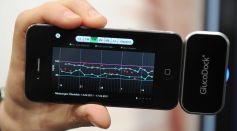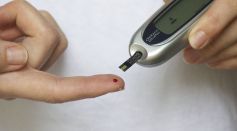Tags: Diabetes

Obesity, Kidney Disease More Likely to Occur in People with Type 1 Diabetes

Diabetes Improvement: Researchers Reveal How Bilberries Help Lower Blood Sugar Levels

‘Remote Bolusing’ Through Mobile Smartphone Apps Helps Improve Type 1 Diabetes

Chai Tea: How Does This Healthy Drink Help Reduce the Risk of Diabetes, Improve Digestion?

Overweight Children Have Higher Rates of Arterial Stiffness; Childhood Obesity Increases Risk of Heart Problems and Type 2 Diabetes

Paracrine Receives Full FDA Approval of Investigational Device Exemption (IDE) to Launch a U.S. Pivotal Trial in Patients With Diabetic Foot Ulcers

Diabetes Medicine Not As Accessible In Middle-Income Countries Including Sub-Saharan Africa, Study Says

Watch Out For These 7 Unusual Symptoms of Diabetes: Early Detection Could Help Avoid Serious Complications

Genes in Liver Cells Discovered to Mutate During Lifetime; Could Lead to Chronic Liver Disease, Obesity, and Sugar-Related Problems

Is Intermittent Fasting Good for Weight Loss? Study Shows Timing Is Key to Make It Realistic, Sustainable, Effective

Birth Defects From Maternal Diabetes May Still Occur Even With Insulin, Regular Blood Sugar Check

Drugs to Suppress Diabetes Found to Decrease Development of Alzheimer's Disease

COVID-19 and Ultra-Processed Food: Is Coronavirus Mortality Rate Linked with Diet?

Diabetes Care: 5 Tips for Diabetics to Stay Healthy This Monsoon Season

COVID-19 Patients Can Develop Diabetes; Virus Targets Pancreas Disabling Insulin Production

People With Type 1 Diabetes Are Six Times More Likely to Develop Dementia Later in Life

Protein Diminished Diabetes Risks by Elevating Fat-Burning Process
Black Fungus Study Revealed Uncontrolled Diabetes and Improper Steroid Use Caused the Deadly Fungi on COVID-19 Patients

Link Between Diabetes and COVID-19, Does it Exist? Experts Weigh In

Experts Identified Four Main Comorbidities That Lead to COVID-19 Deaths
Most Popular

NASA Artemis II 2026: How to Send Your Name to the Moon on the Next Mission

Falling Into a Black Hole: Spacetime Physics and the Black Holes Explained

10 Unsolved Space Mysteries That Still Baffle Science, From Dark Energy to Cosmic Signals

Service Robots Revolutionize Healthcare, Retail, and Hospitality With Smart Automation





